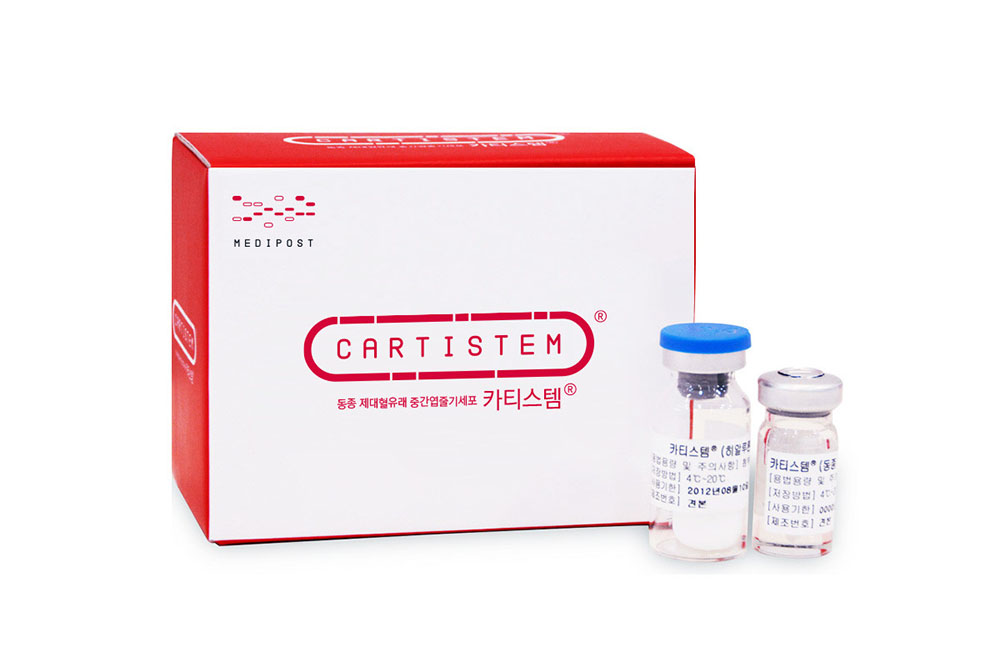 Medipost has announced that its allogeneic human umbilical cord blood-derived mesenchymal stem cell product for knee osteoarthritis was featured in the peer-reviewed Orthopaedic Journal of Sports Medicine.
Medipost has announced that its allogeneic human umbilical cord blood-derived mesenchymal stem cell product for knee osteoarthritis was featured in the peer-reviewed Orthopaedic Journal of Sports Medicine.
The Seoul, Korea–headquartered company specializes in allogeneic umbilical cord blood-derived mesenchymal stem cells for various therapeutic applications.
Medipost’s Phase 3 study found that 97% of recipients of its Cartistem cellular therapeutic agent showed significant improvement in cartilage restoration after 48 weeks.
Participants in the study underwent a five-year observational follow-up.
More than a decade of Cartistem history
South Korean regulatory authorities approved Cartistem in January 2012, making it one of the world’s first companies to obtain approval for cell therapy.
Medipost is optimistic about the potential to expand the use of Cartistem, given the rising rates of knee osteoarthritis. “People are getting cartilage damage at an early age,” said Antonio Lee, co-CEO of Medipost America.

[Image courtesy of Medi-Post]
Data presented at the 2018 American Academy of Orthopaedic Surgeons (AAOS) meeting found that the average age for knee replacement surgeries fell from 68 in 2000 to 66 in 2014.
“In the past five years, the average age of patients getting total knee replacement procedures in the U.S. has continued to fall,” Lee said.
Total knee replacement procedures are often used as a last resort for patients after other therapeutic options have failed.
Medipost eyes the U.S. market
Medipost is also working to make Cartistem available in the U.S. market.
“One of the unique things that we’d be able to provide the U.S. market is a long history of clinical use,” said Edward Ahn, the other co-CEO of Medipost America.
While FDA routinely approves products based on clinical data, Catistem already has more than 10 years of data from real-world use in South Korea.
The company also has significant clinical and preclinical research, including a 2007 Phase 3 trial performed in South Korea. “And since the Korean launch of Caristem in 2012, we’ve treated more than 23,000 patients,” Lee said. “And since that time, we have also been engaged with the FDA for a U.S. trial.”
An earlier Phase 1/2 study of Caristem largely repeated work the company previously performed in South Korea.
“We are preparing to start a Phase 3 study in the U.S. in the next couple of years so we can go for U.S. approval,” Lee said.
Medipost believes Cartistem could provide a less-invasive treatment option for older patients while also providing a potential therapy to patients too young for a total knee replacement (TKR).
AAOS notes that TKR revision surgery is “a longer, more complex procedure” than the initial TKR surgery.
Self-regeneration
By contrast, Cartistem is designed to act as more of “a stimulator to the patient’s self-regenerative capacity,” Lee said. “Everybody has that, but it just decreases with age.”
In addition, the body readily accepts mesenchymal stem cells, which can be transplanted without causing an immune response.
Although mesenchymal stem cells (MSCs) can eventually differentiate into cartilage, bone or muscle, Medipost does not differentiate the cells in the Cartistem product itself. “We leave them in a naive state,” Lee said.
Surgeons administering Cartistem stem cells implant them in portions of the knee with cartilage damage or loss. Surgeons also perform a bone marrow drilling procedure. “It is similar to microfracture surgery, where surgeons deliberately drill holes through the bones to bring out the patient’s bone marrow progenitor stem cells that can make the cartilage and bone.”
Lee said knee osteoarthritis patients who have received the Cartistem can eventually “run, play golf and whatnot — without pain.”
Lee said that the technology’s ability to heal was demonstrated in the Phase 3 trial. “The function of the knee is sustained,” he noted. “The lifespan of TKR is only about 10 years, and during that period, patients’ mobility is restricted.”
The excitement we see from the orthopedic community and surgeons both in Korea and the U.S. is that we can nearly restore the function of the normal knee,” Lee continued. “Patients don’t have to live with medications or mechanical implants like with TKR.”
Medipost is also developing a next-generation intra-articular injectable treatment for osteoarthritis known as SMUP-IA-01.
Filed Under: Cell & gene therapy





Tell Us What You Think!
You must be logged in to post a comment.